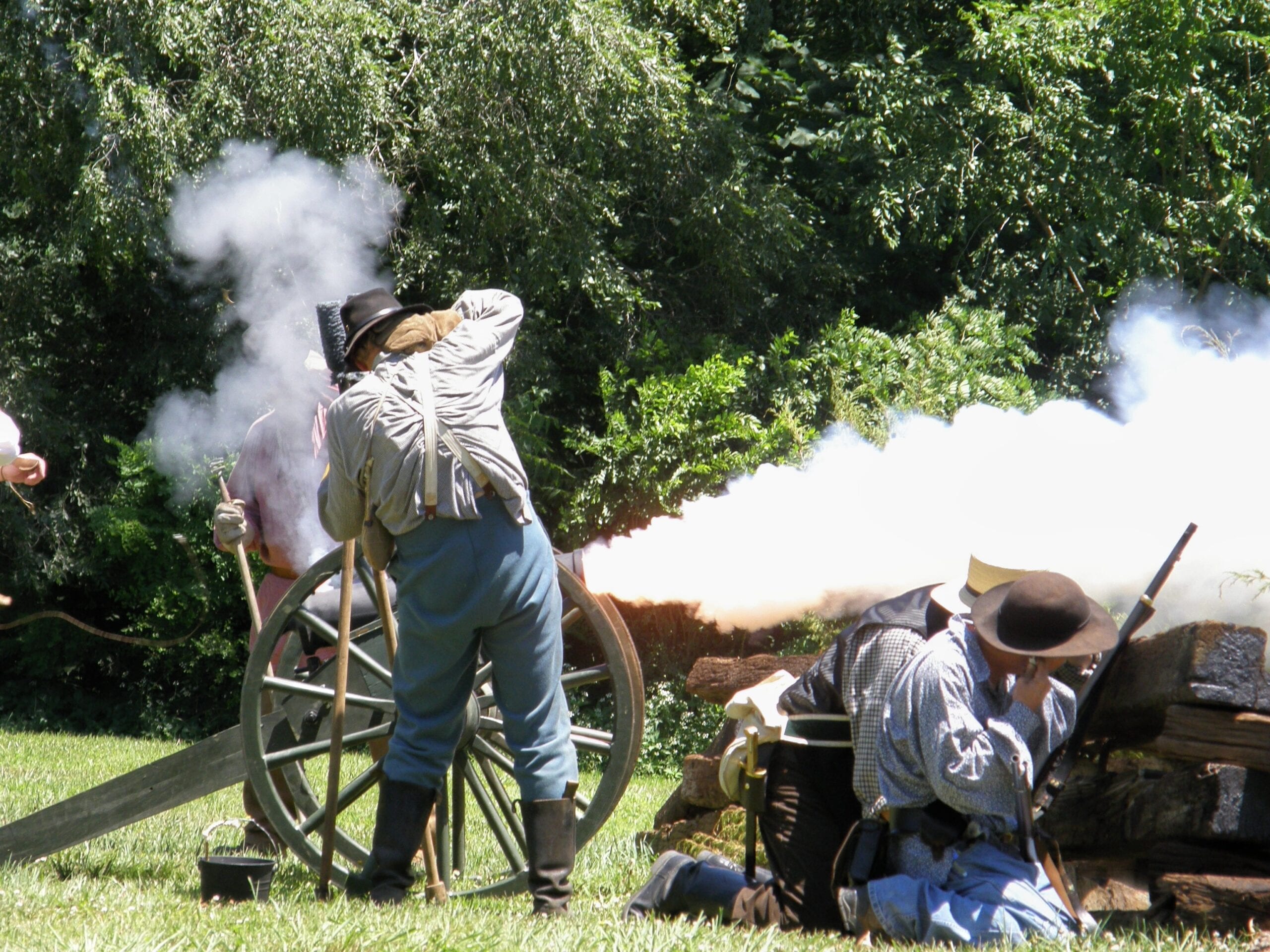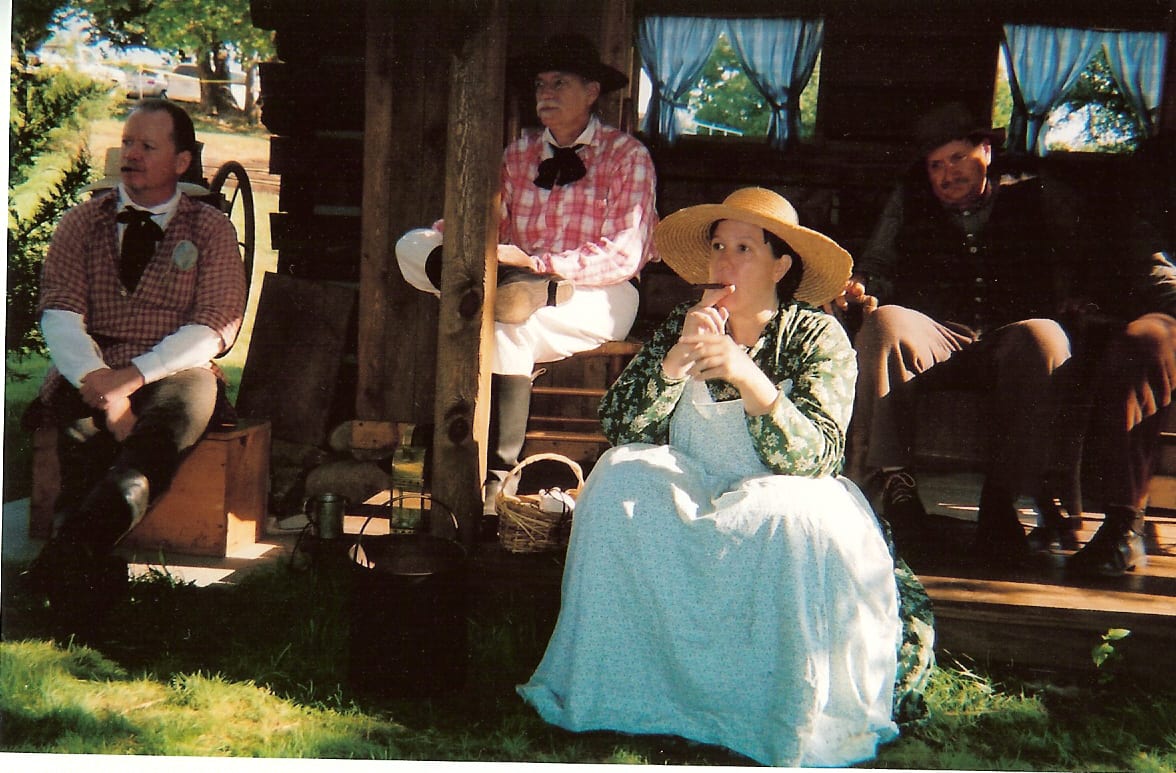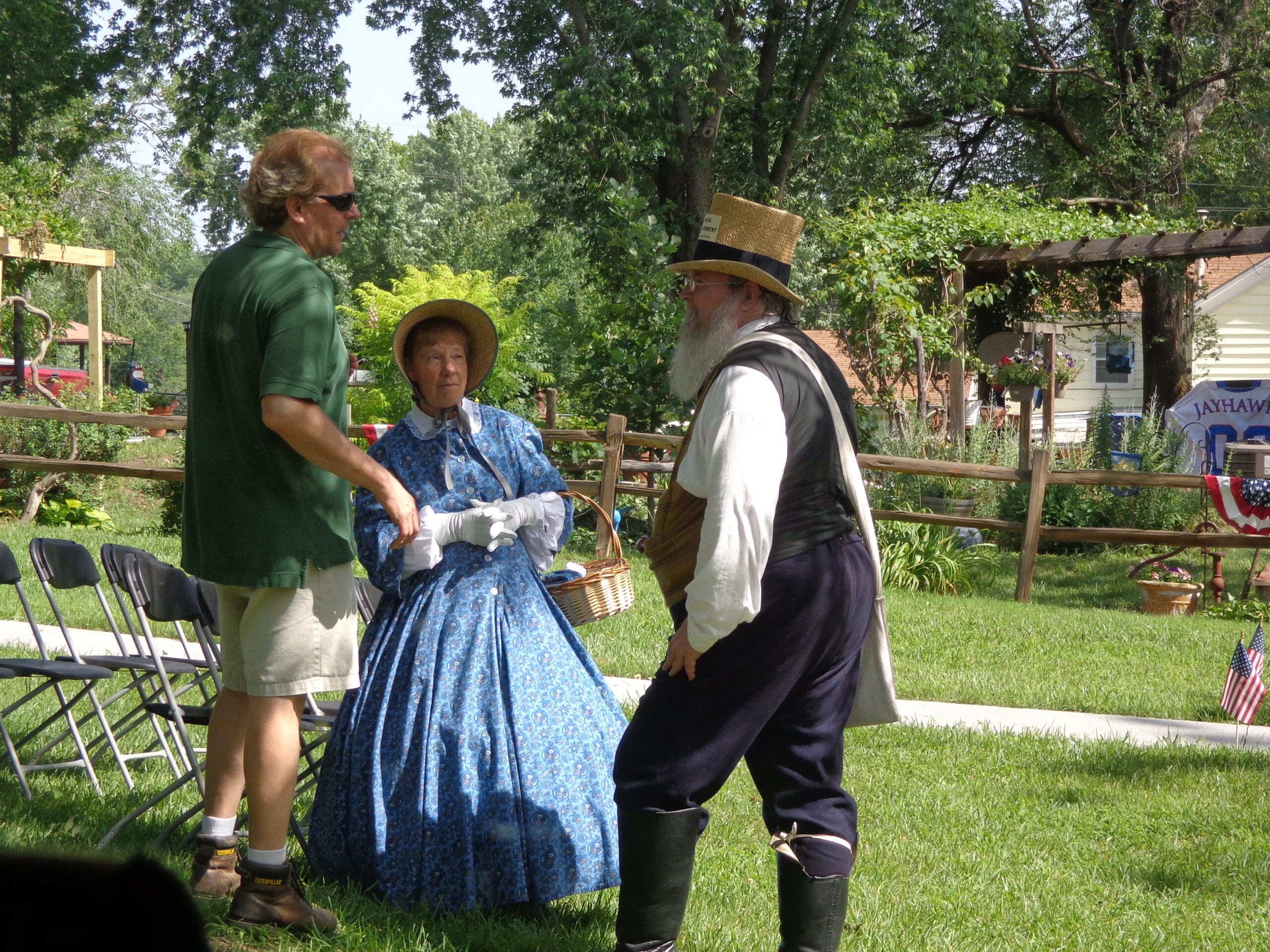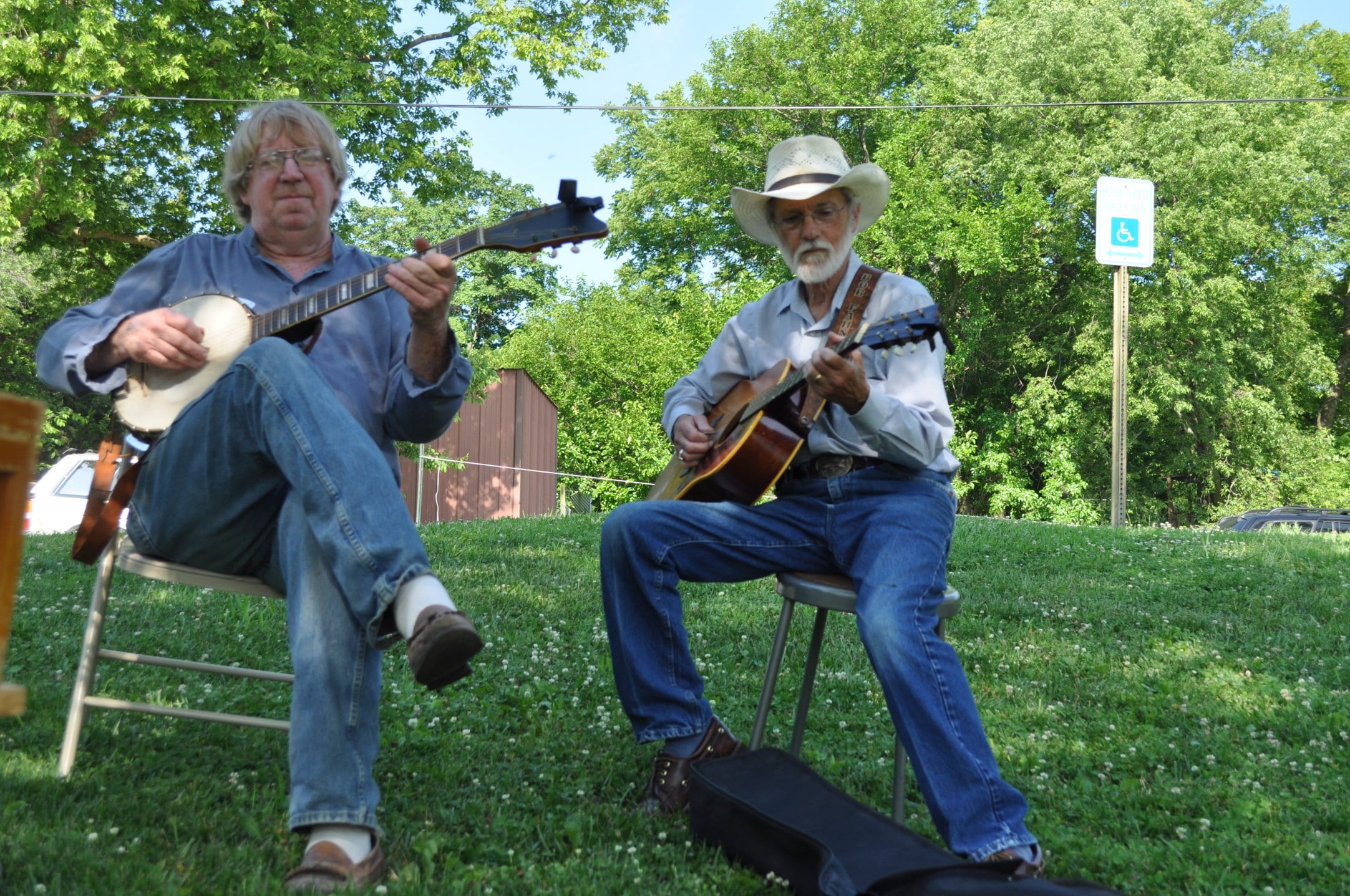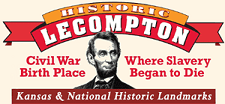What’s there to do in Lecompton?
There is lots to do in Lecompton! From taking a walking tour, to seeing a big rock, to kayaking on the Kansas River, to having a yummy lunch, to shopping–we’ve got it. Lecompton is a perfect day-trip destination, or a great place to stop when you are traveling through the area.
Lecompton was voted a “best small town” in Kansas by the readers of KANSAS! Magazine! Come see why! See both museums and treat yourself to breakfast or lunch in one of the two places to eat in Lecompton. Meet your friends here and make a day of it!
TOUR SHOP EAT
Tour both museums: Constitution Hall and the Territorial Capital Museum.
Shop our cute stores: Recollections (a fabulous antique and gift shop) and Claymama’s (an art boutique). Plus the museum gift shops!
Eat at both of Lecompton’s eateries: Aunt Netter’s has breakfast and lunch and amazing desserts and Kroeger’s Country Meats has delicious made-to-order sandwiches. Get some of Kroeger’s famous 13 flavors of sausage to take home! Or take home some of Aunt Netter’s mouth-watering fruit or cream pie, cupcakes, cinnamon rolls, or cookies!
- Lecompton Reenactors perform for school groups and adult groups–call to schedule.
-
- Built in 1856, the Lecompton Constitution was drafted and signed in this building.
- Lane University was named for James H. Lane. Portrait at the Territorial Capital Museum in Lecompton, Kansas.
-
- Reenactors at the Battle of Fort Titus
-
-
- Aunt Netter’s Cafe
-
- Kroeger’s Country Meats
- Lecompton Reenactors bring the Bleeding Kansas era to life!
- Meetings took place here during Territorial times!
Beautiful downtown Lecompton on Elmore Street.
Territorial Capital Museum in Lecompton, Kansas
Walking Tour
Lecompton is a small town with a big history. There is no shortage of historic sites of interest. Follow our Walking Tour or drive it to get a good feel of the fascinating history of Lecompton. Many of the historic sites have QR codes that link to short videos made by our local elementary school. https://lecomptonkansas.com/historic-walking-tour/
If you don’t feel like doing a walking tour: then you can see the historic sites individually! See the listing below for some ideas of places to visit or explore.
Lecompton City Jail (1892)
Experience prison life in our 1892 jail. Contains the original door, hardware and original window bars. Used until the 1920’s as a jail. Relocated in 2012 from private to public property next door to Constitution Hall on Elmore Street.
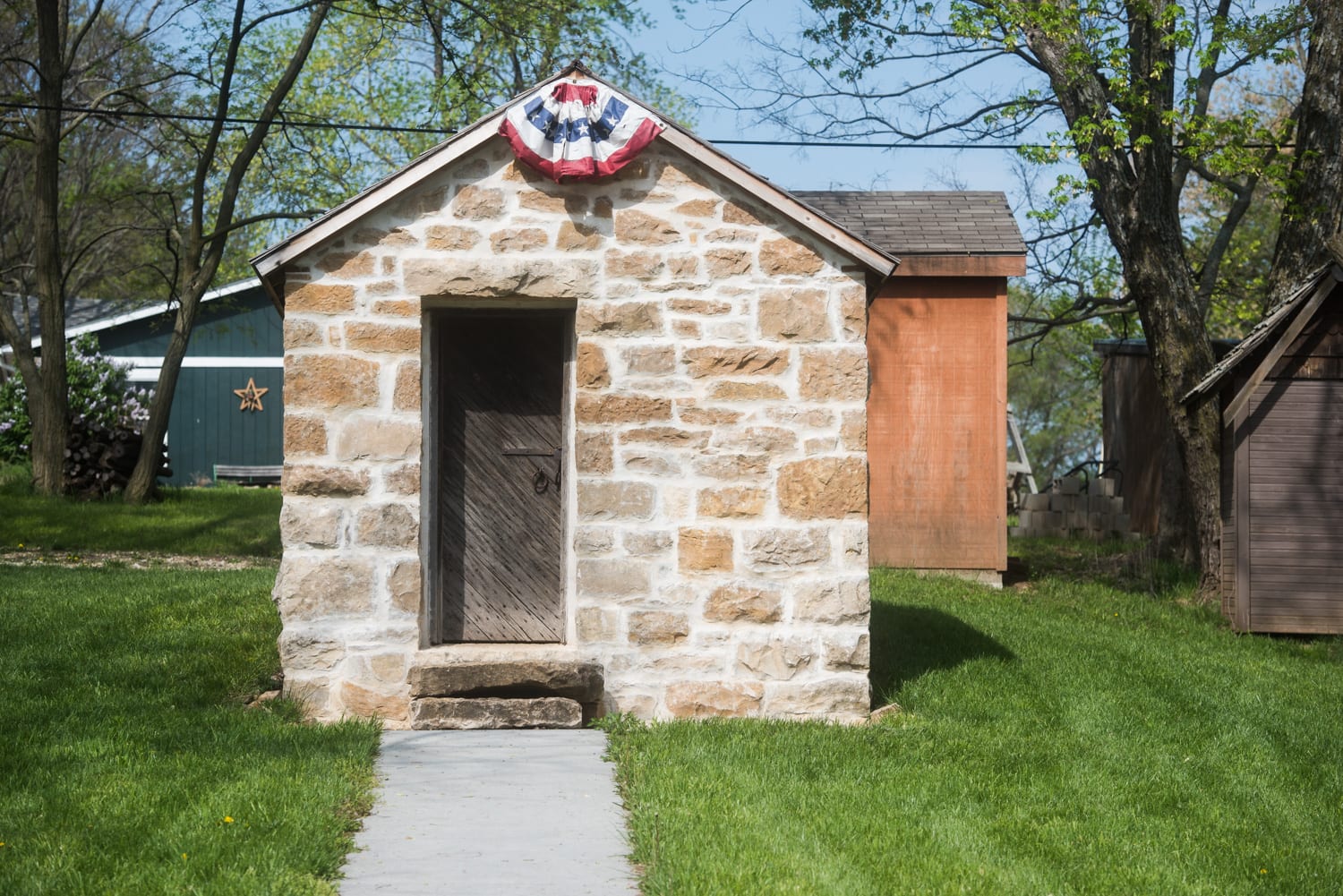
Sheriff Samuel J. Jones Tombstone
The original tombstone of Kansas Territorial Sheriff Sam Jones. Only a tombstone—no body or grave. See this on Elmore Street in front of the 1892 Jail.
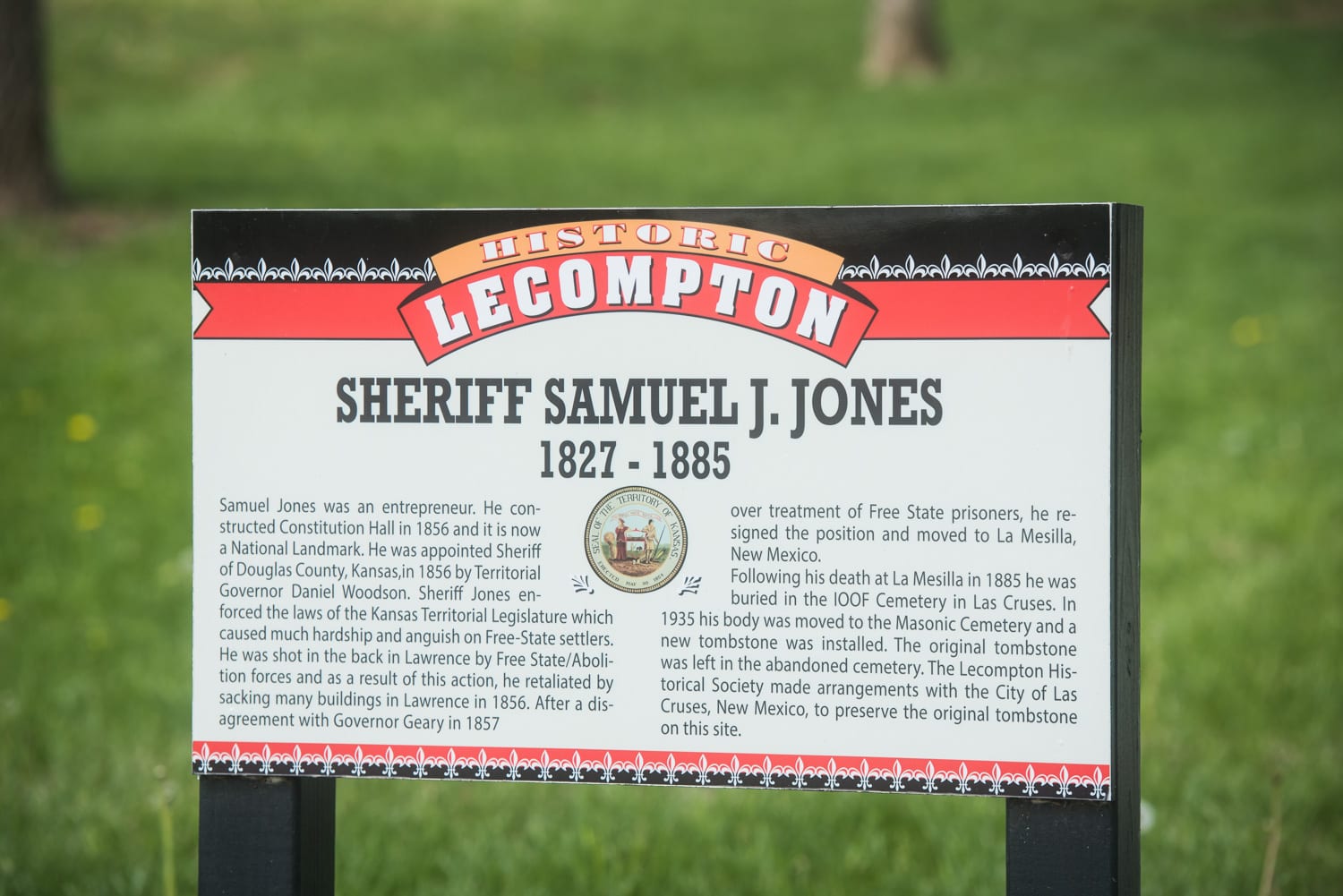
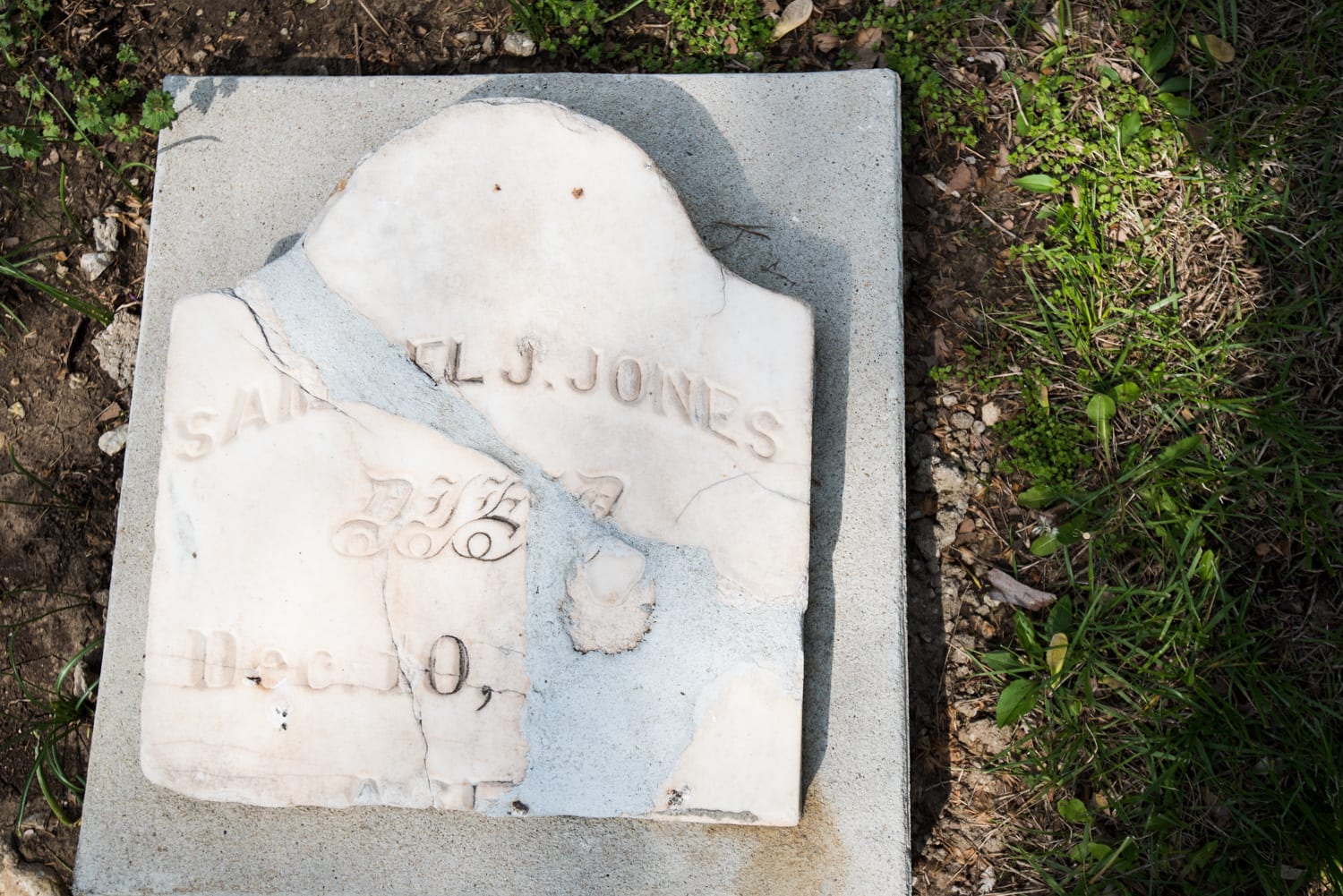
Street Signs
Find your way with our street signs while learning a little Kansas territory history. Lecompton city streets bear the names of early-day territorial officials and town founders . Woodson Avenue was named for Daniel Woodson, acting governor and town company officer. Elmore Street, known during the territorial period as the “Wall Street of the West,” for Judge Rush Elmore, a territorial district judge. Halderman Street for John Halderman, town company officer and member of the 1855 territorial council. The town was named after the territorial judge Samuel LeCompte.
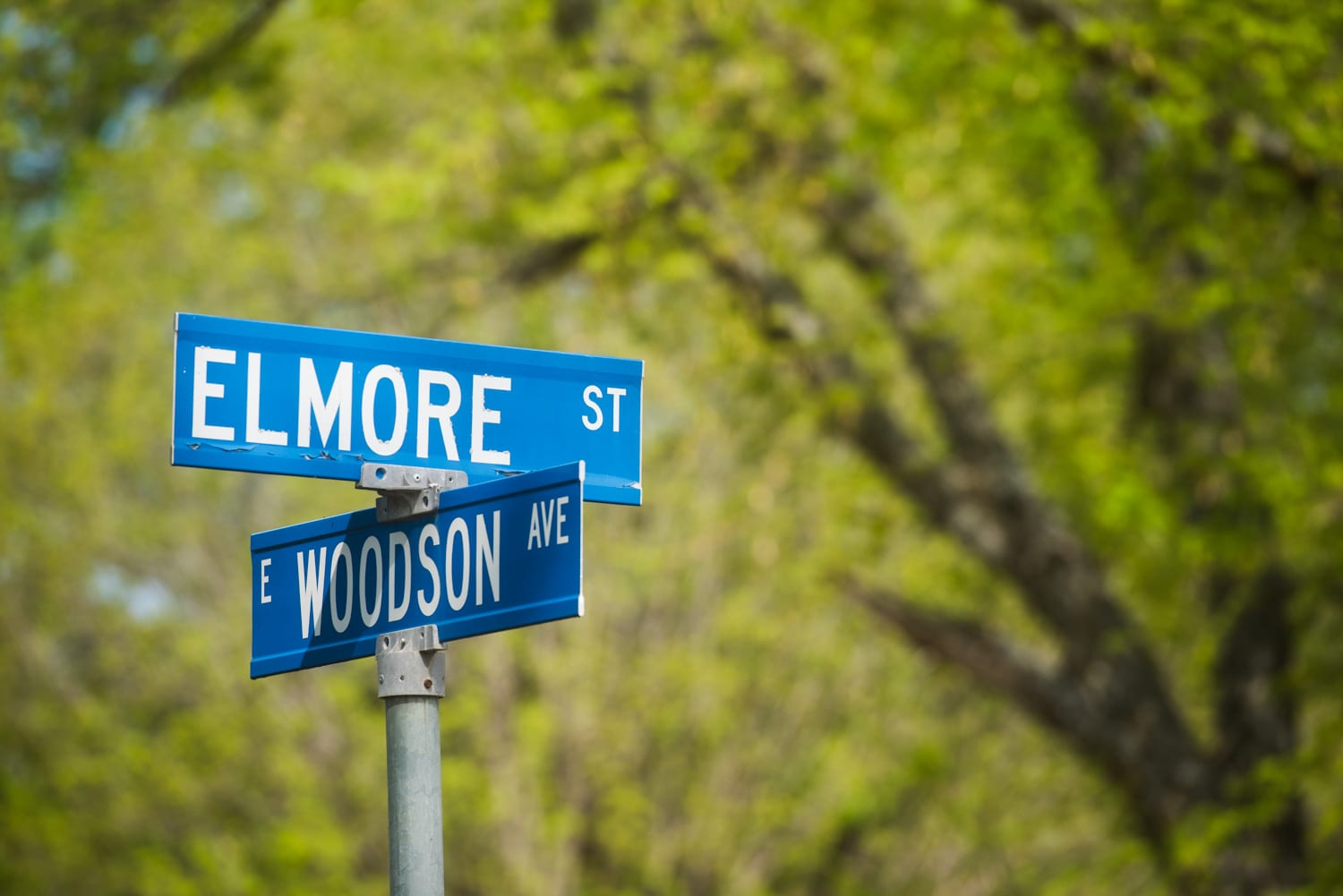
Drive along the Scenic River Road
The River Road was originally a highly traveled wagon road accommodating both free state and slave advocates, each working diligently to make Kansas Territory their own!
The eastern end of the Scenic River Road begins at Lake View, northwest of Lawrence, and ends at Lecompton. The road parallels the Kansas River. Bald Eagles are often sighted along this route!
Traveling west on Woodson Ave. through Lecompton for one-half mile, you can continue on the River Road–a very scenic route to Topeka
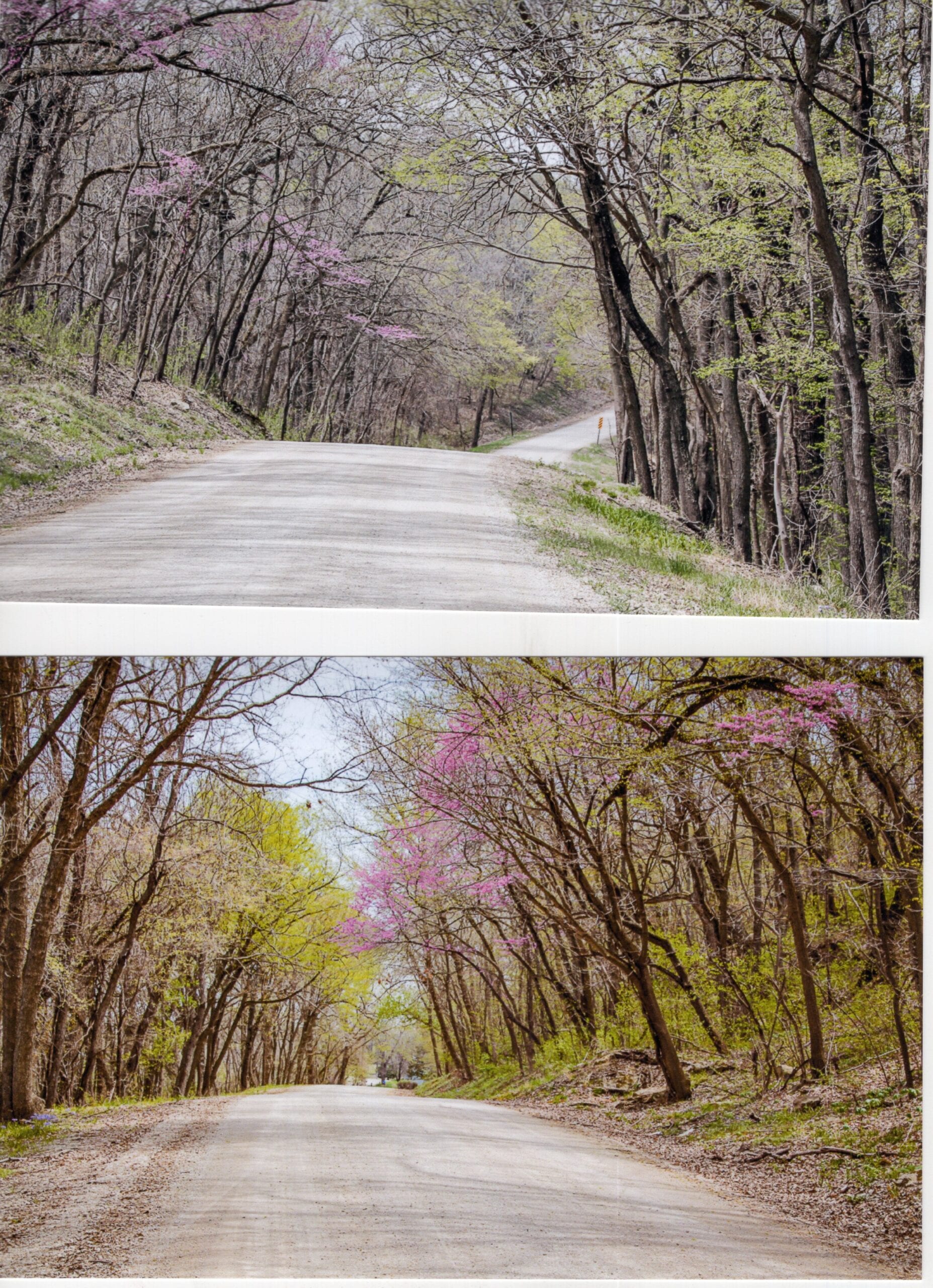
Post Office Mural (1985)
Ellen Duncan, Lecompton artist- in-residence, created this mural of downtown Lecompton using old photographs taken of the east side of Elmore Street before the disastrous 1916 Fire. Go inside the Post Office on Woodson to see the mural.
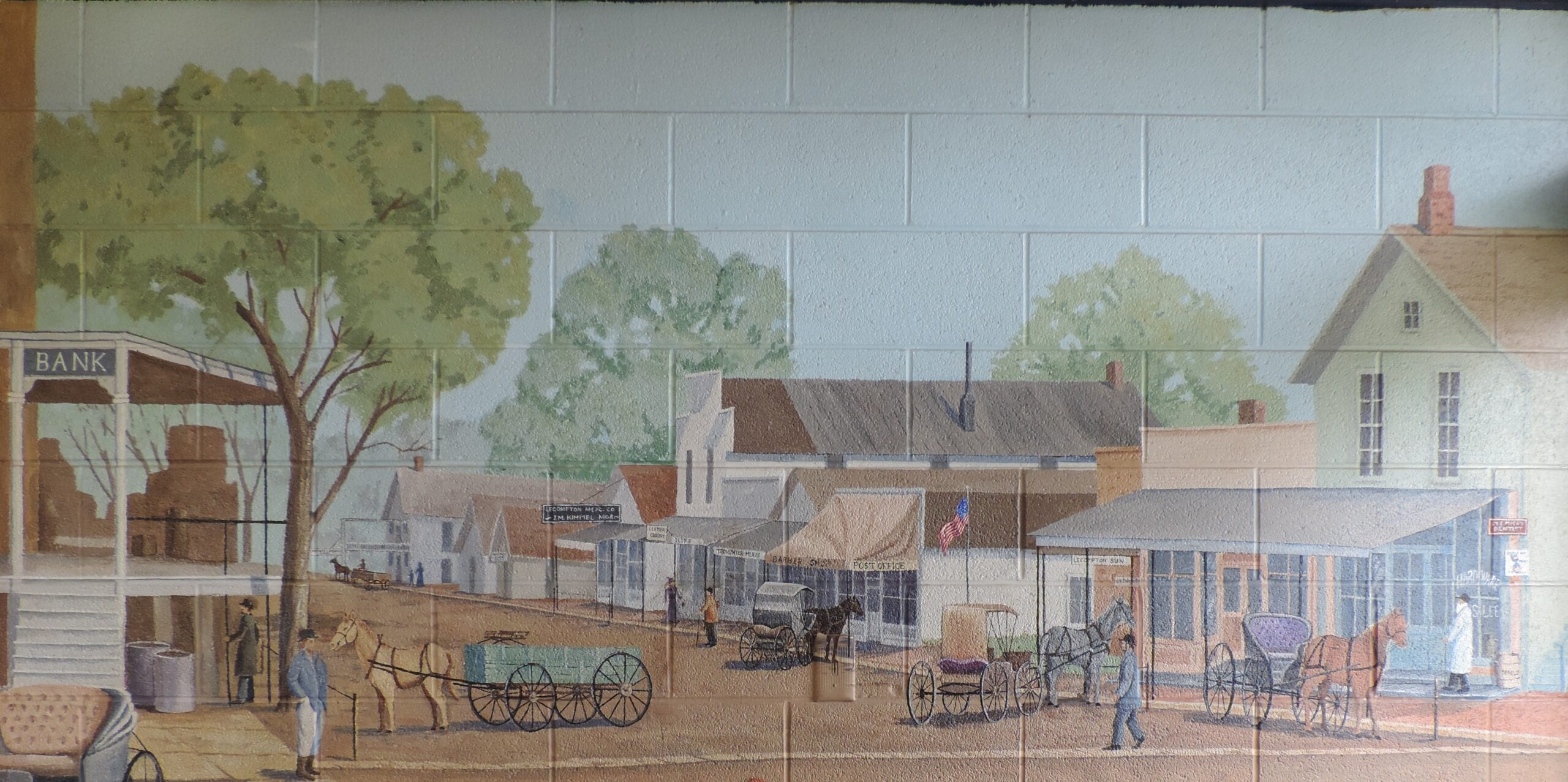
Your content goes here. Edit or remove this text inline or in the module Content settings. You can also style every aspect of this content in the module Design settings and even apply custom CSS to this text in the module Advanced settings.
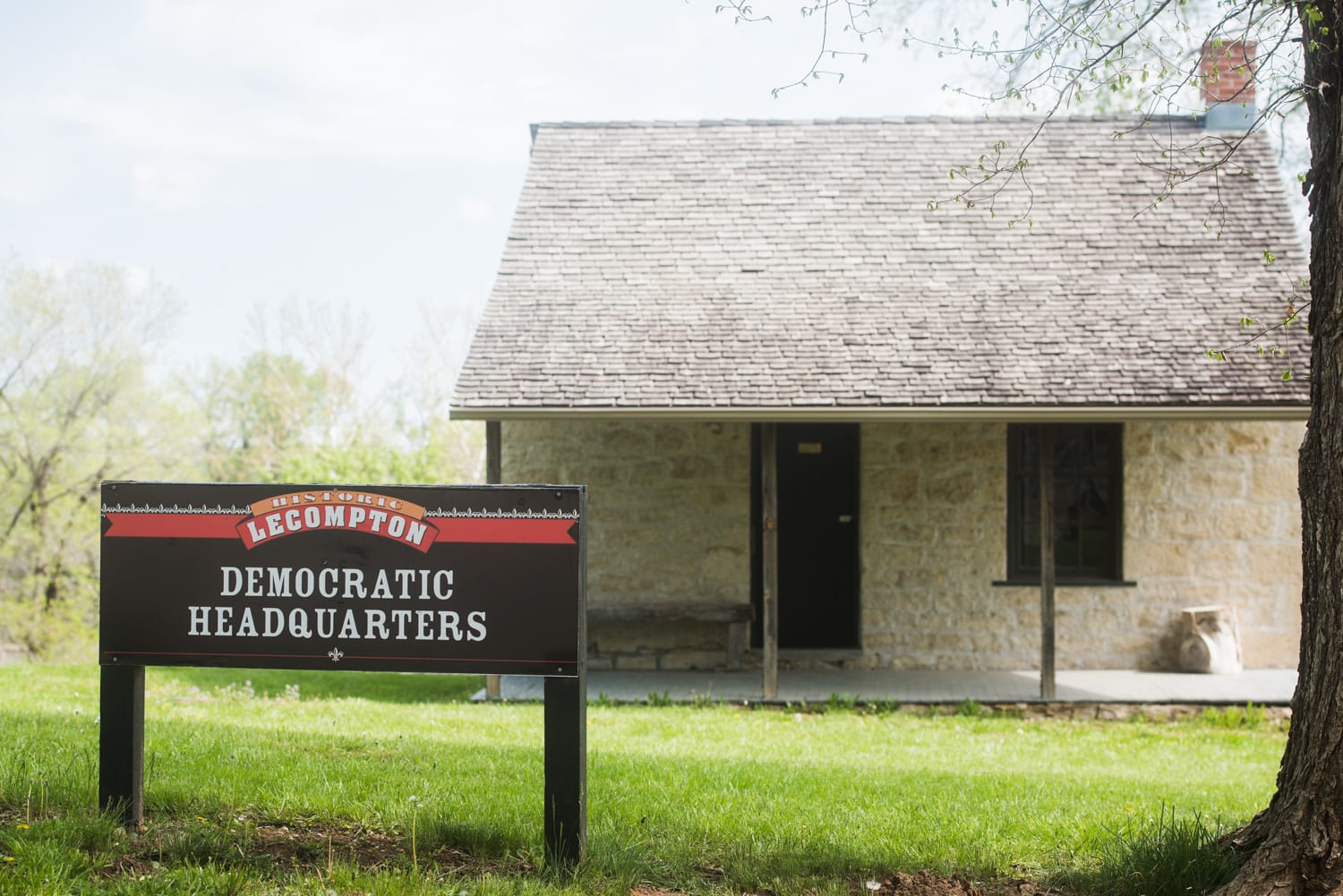
Fort Titus
View a replica of the fortified home of Col. Titus, the site of the Battle of Fort Titus. Ft. Titus was a proslavery strong-hold in Douglas County about two miles south of Lecompton on the east bank of Coon Creek. Colonel Henry Titus built a fortified log house as a rendezvous point and place of defense for proslavery men fighting their Free State neighbors. This replica cabin is on Woodson Avenue right by the big brick high school.
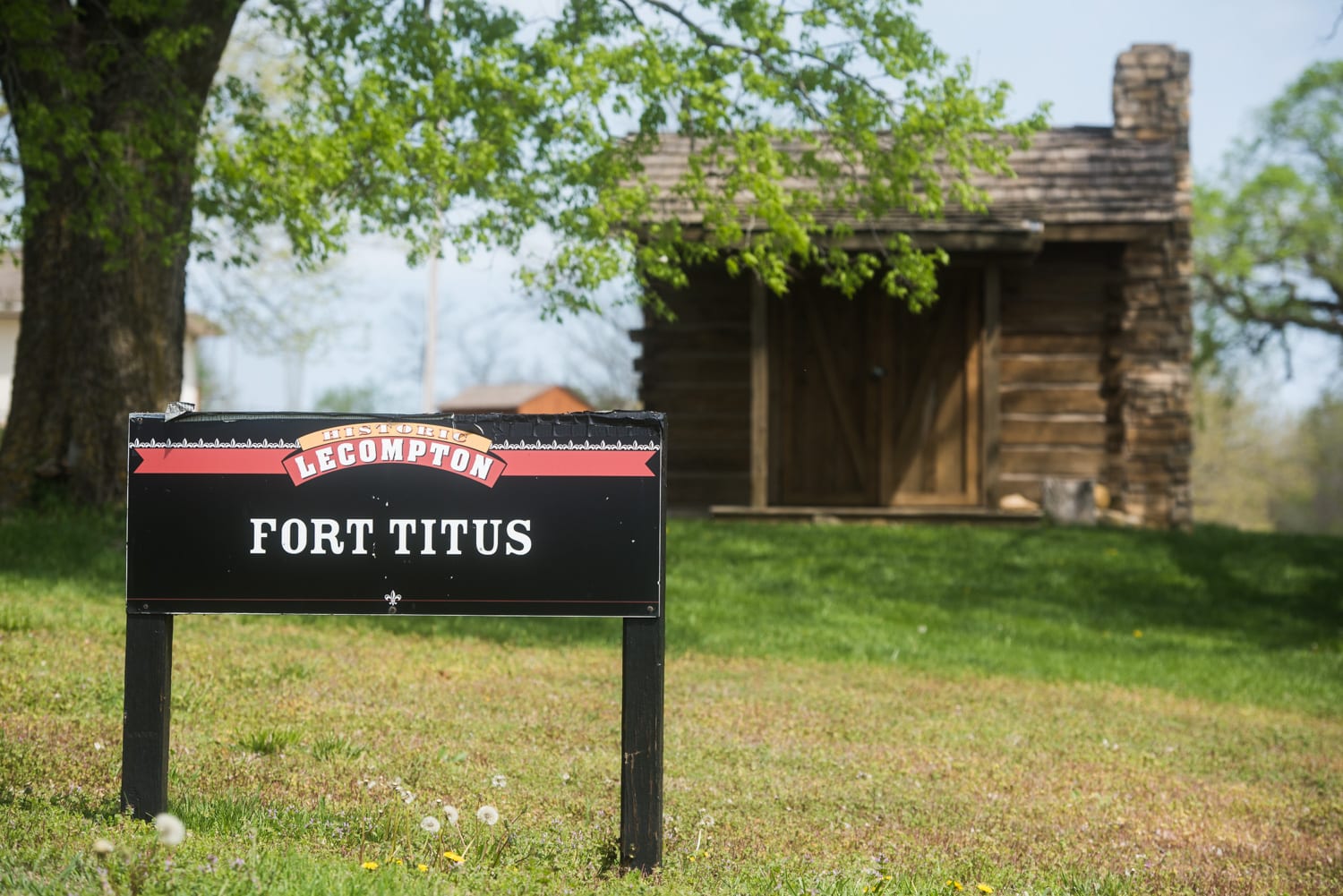
One of the oldest wood-frame buildings in Kansas. Where the infamous Lecompton Constitution was written and signed. Designated a National Historic Landmark in 1975. Dedicated as a museum in 1995. Constitution Hall is at 319 Elmore Street.
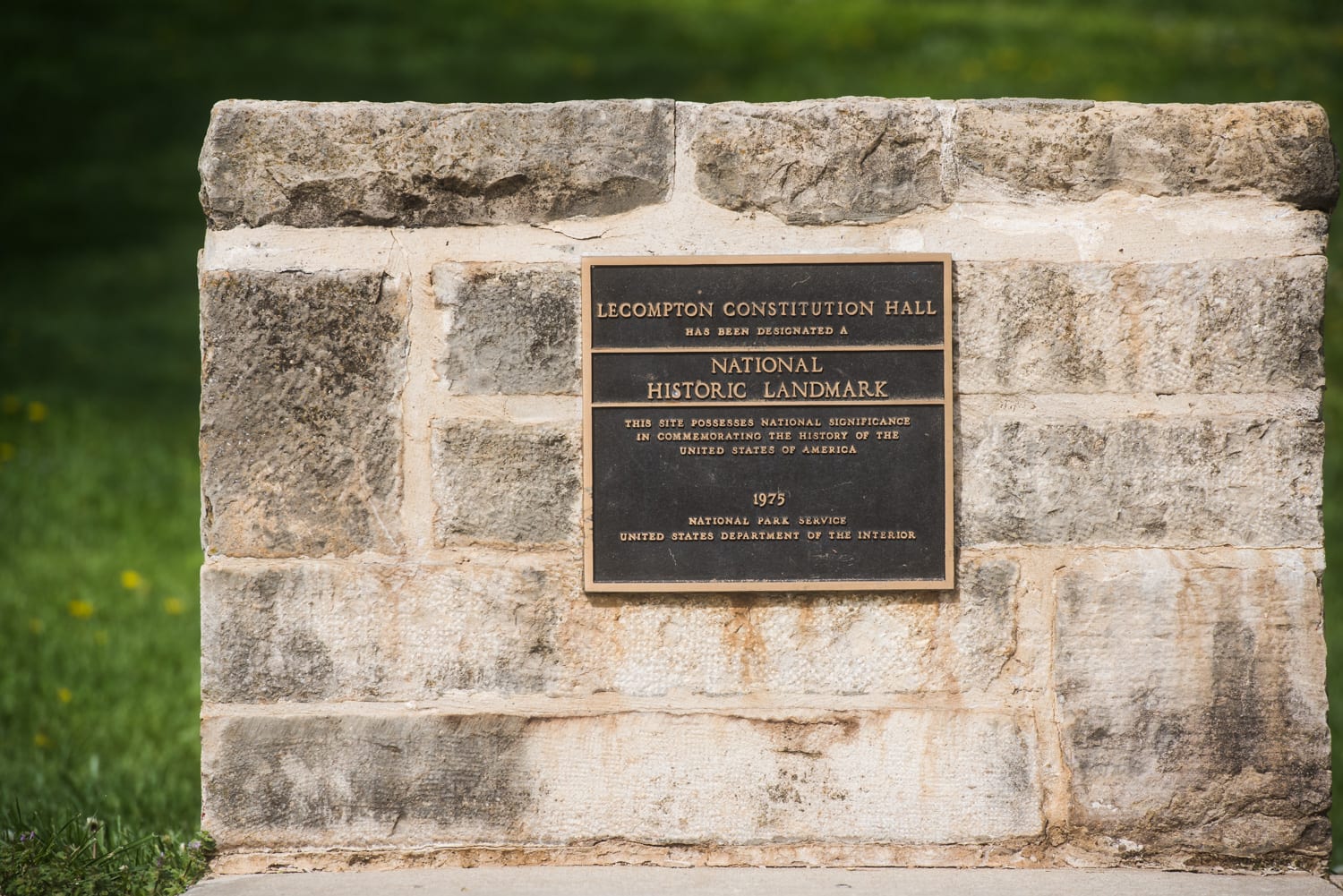

Winter School
Drive by the Winter School House outside of Lecompton on Road 438, also known as the Farmer’s Turnpike. This school was used 1871-until the 1950’s when the school district was consolidated. The school building was used for several years as a community building. On private property, so no trespassing!
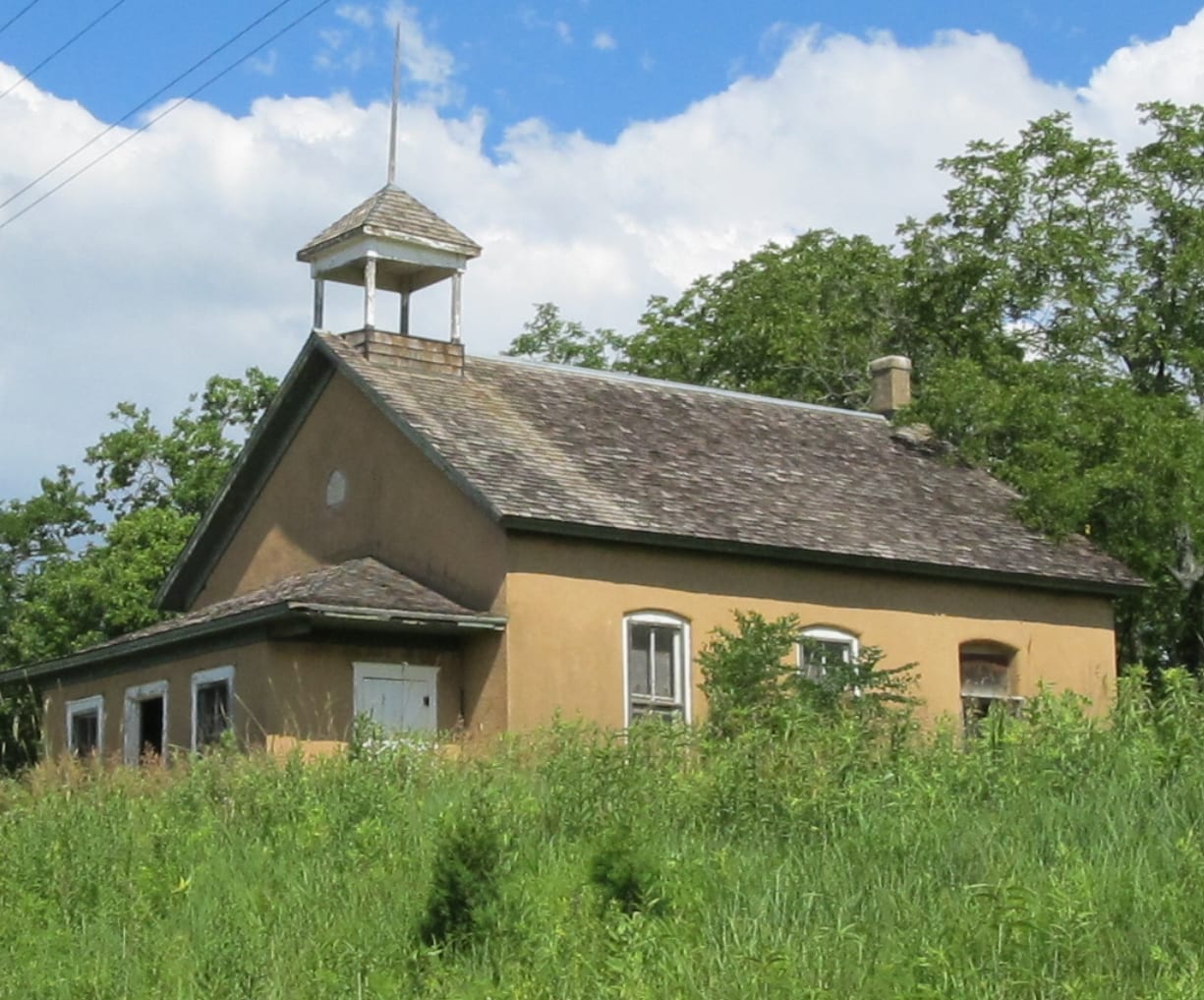
Ice Age Remnants
We’ve got big rocks! This boulder was carried to what is now Lecompton by a glacier during the ice age. It is sioux quartzite brought down from what is now South Dakota area. Find this boulder just North of the corner of Halderman and Woodson in Lecompton, KS. (See the Territorial Capital Museum in the background?) Also, come inside the Territorial Capital Museum to see a big piece of petrified wood brought to this area in a glacier.
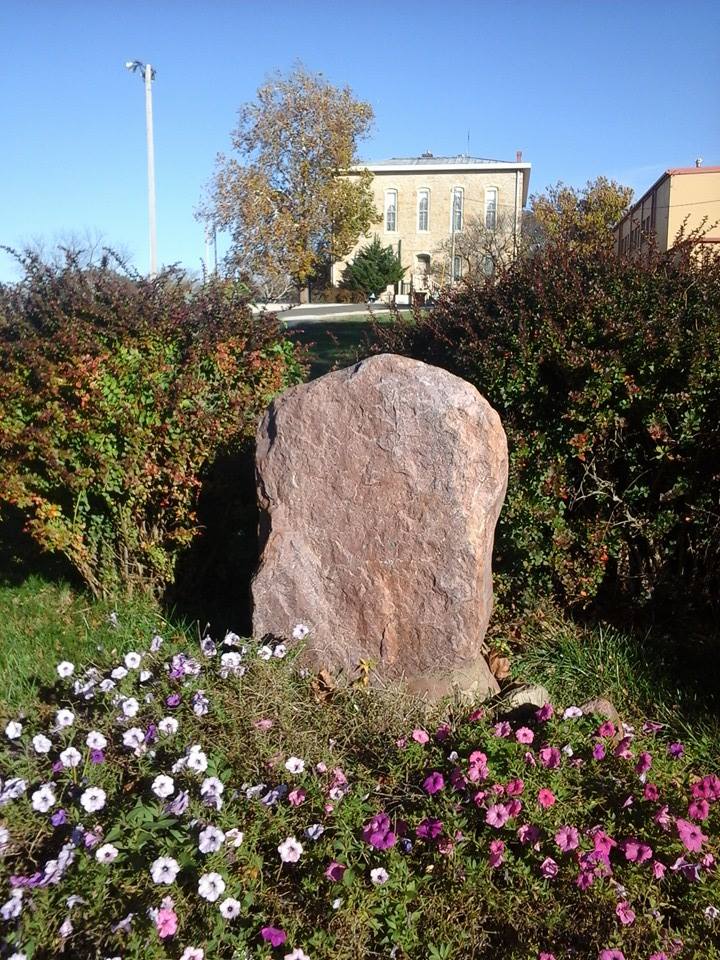
Kansas River Water Trail
Like to canoe or kayak? Lecompton has a great river access point. The Kansas River Trail is a great opportunity to explore the unique beauty of eastern Kansas from a whole new perspective – from the river itself! To access the river, go north on 1029 (or Eisenhower Memorial Drive) across the bridge. Take the first left (it’s a dirt road) to get to the river. Careful–don’t take the second left–that’s a farmer’s field!

Look for Bald Eagles
Did you know that before the town took the name “Lecompton” it was called “Bald Eagle?” Afterwards, the town was named after the territorial judge Samuel LeCompte. We have beautiful bald eagles soaring along the Kansas River, most commonly spotted during Fall, Winter and Spring. A good place to try to spot the majestic national bird is from the Bald Eagle River View Park– where the Democratic Headquarters is located on 2nd Street. Another good place is along the Scenic River Road east of Lecompton. The old road is alongside the Kansas River and is just beautiful! See the description for the road above.
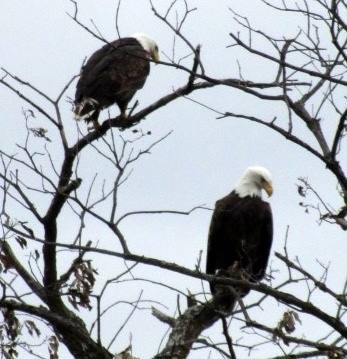
Veteran’s Monument
Take a minute to visit our Veteran’s Monument in Lecompton. Located between Constitution Hall and our City Hall on Elmore Street. Our Monument lists all of those who served in the military from 1861-2011 from the towns of Lecompton, Stull, Big Springs and the Kanwaka area.
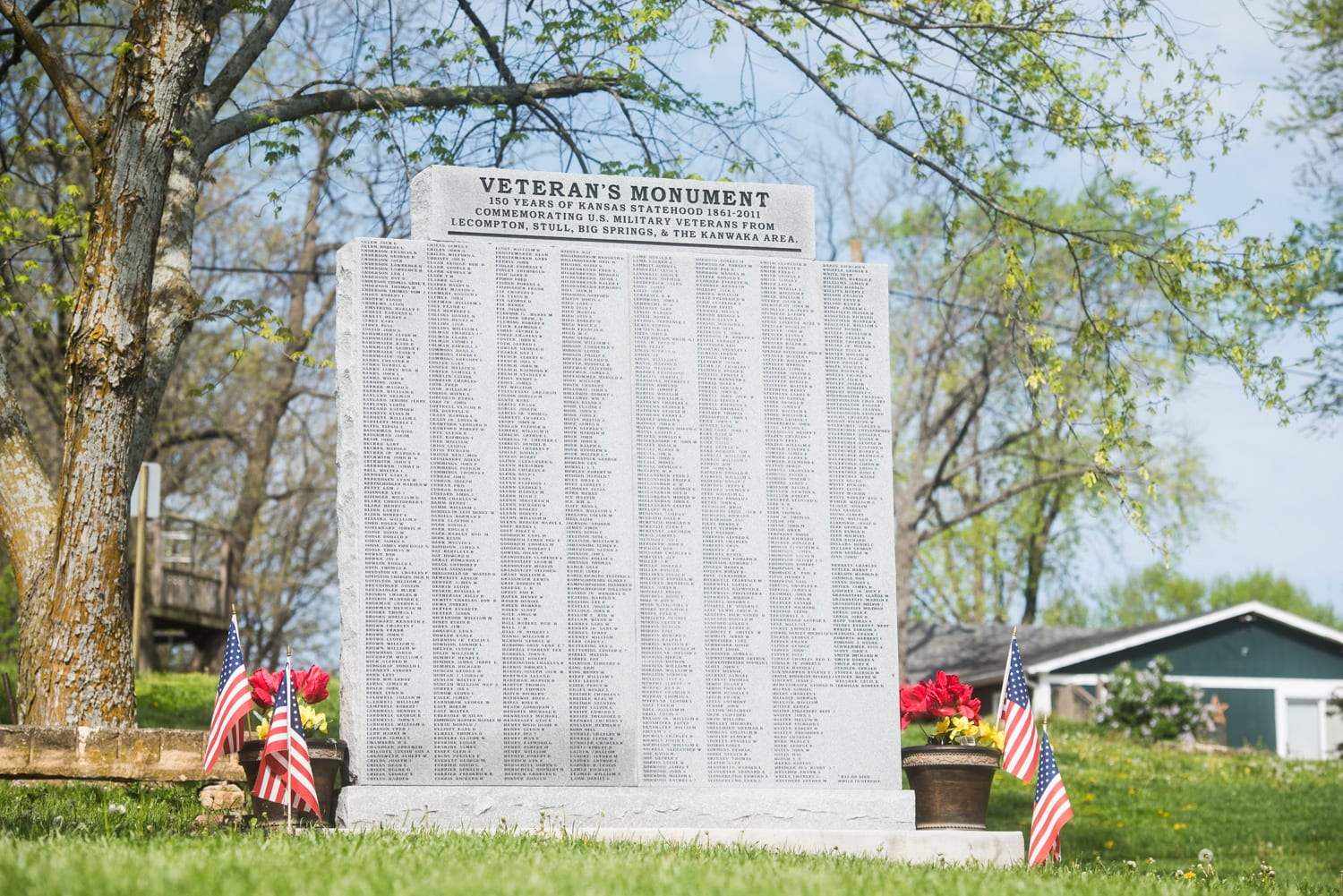
Territorial Capital Museum (Lane University) (1882)
This museum chronicles the history of Lecompton from territorial times to the present. The museum has everything from cannon balls from the Bleeding Kansas conflict, to quilts. Construction began here on this location for an elegant capitol in 1855 with a $50,000 appropriation from Congress. Only the basement and the stone foundation was completed. Work ceased for good by 1857 when all the money was spent and antislavery legislators gained control. The unfinished capitol building was deeded by Kansas in 1865 to Lane University. Lane University building constructed in 1882 using capitol ruins. The University closed and moved to Holton, Kansas, in 1902. The building was then used as the Lecompton High School until 1927. Lecompton Historical Society organized in 1968 to save the abandoned, deteriorated structure. Restored, rehabilitated, and opened to the public as a museum in 1982. Find the museum at 640 E. Woodson, behind the old brick high school building.

Lecompton High School (1927)
See a community play or take a class in the beautiful school building. Lecompton Rural High School from 1927 to 1970 and owned today by the City of Lecompton, and operated by Lecompton Pride. Before Lecompton had this building, high school was taught in the Lane University building from 1902-1927. On Woodson Avenue!
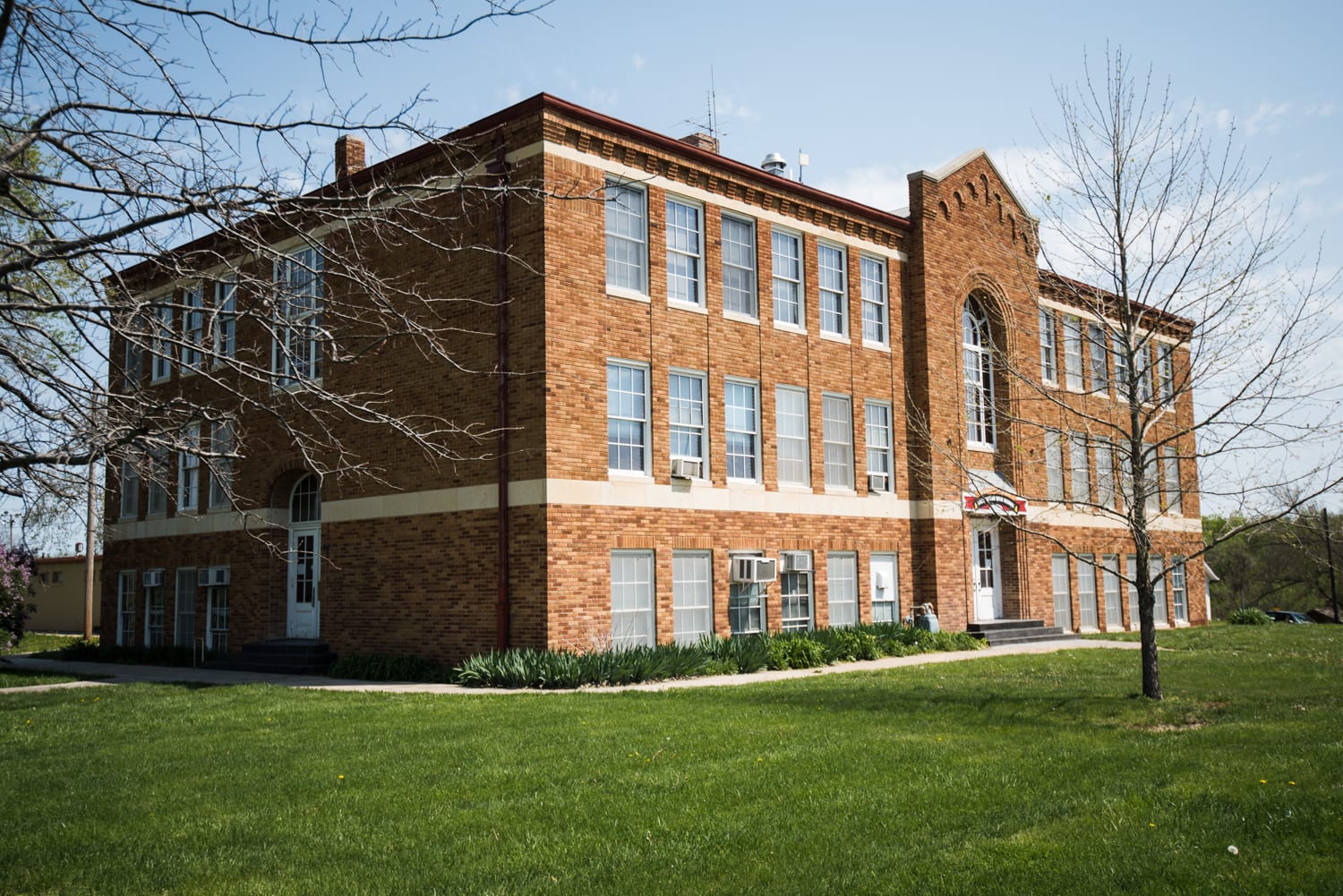
Windsor Hotel (United Methodist Church) (1884)
The church wasn’t always a church. It was originally constructed as a drug store by B.H. Leslie in 1884. Then it was remodeled and renamed the Windsor Hotel in 1903. Then purchased and remodeled in 1921 by the United Brethren Church. It became the Lecompton United Methodist Church in 1968 with the merger of the town’s United Brethren and Methodist Churches. It is home to the famous 1885 Chickering Grand Piano used at Lane University. At the corner of Woodson Ave. and Elmore Street.
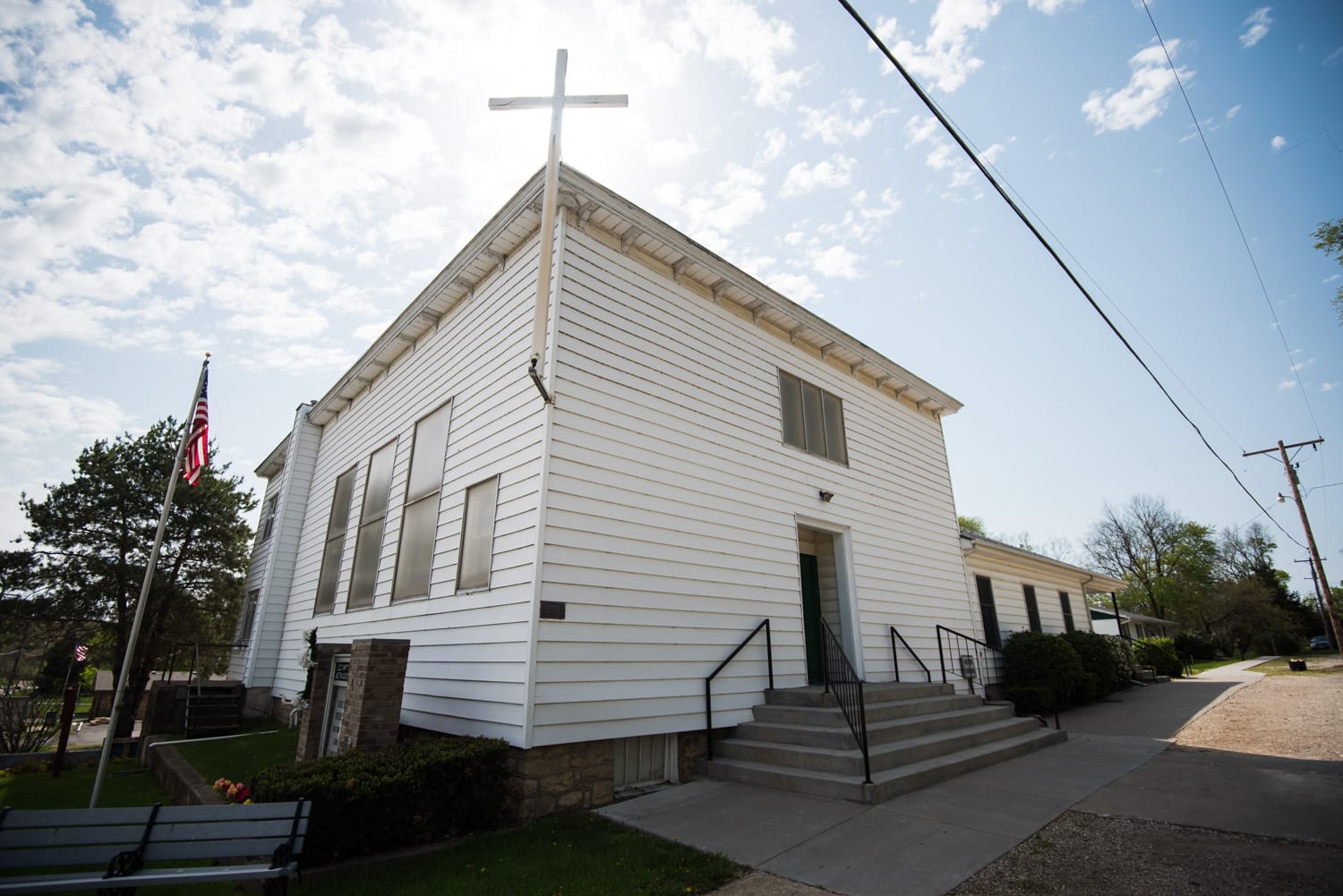
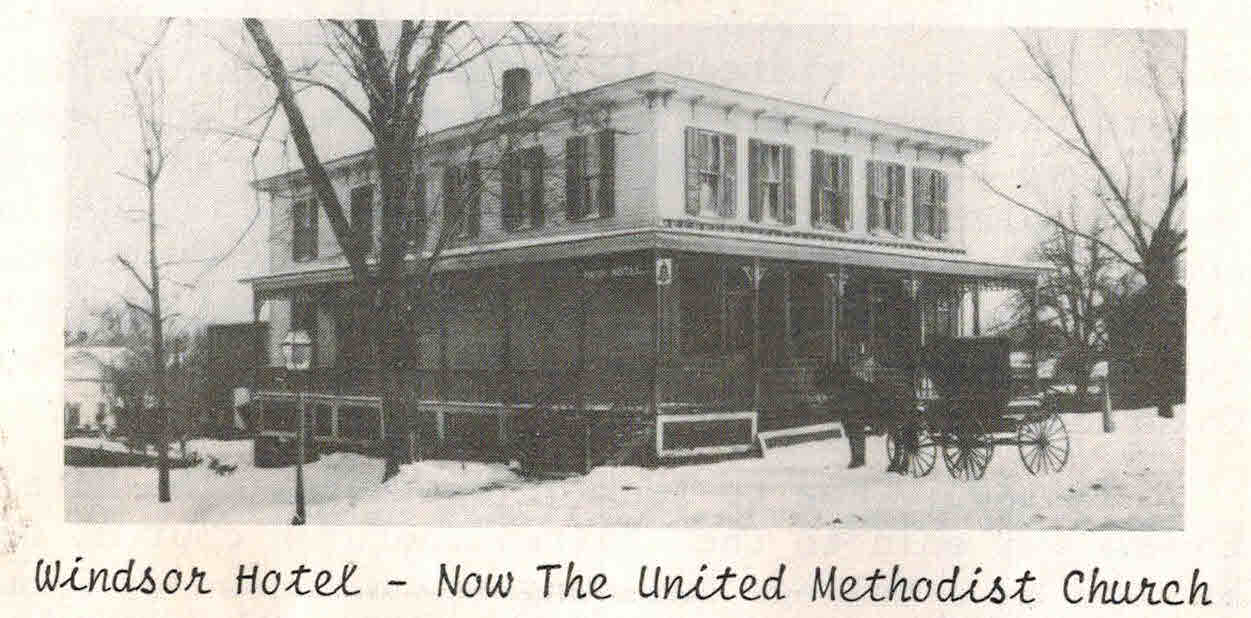
Shop and Eat
Refresh and revive yourself with some good shopping and eating. See the newly revitalized downtown area on Elmore Street with vibrant shops and eateries. The brick buildings are dated to 1918. A 1916 fire destroyed all of the original wood buildings. Other shops and eateries are along Hwy 1029 in Lecompton. The two museums have small but mighty gift shops.
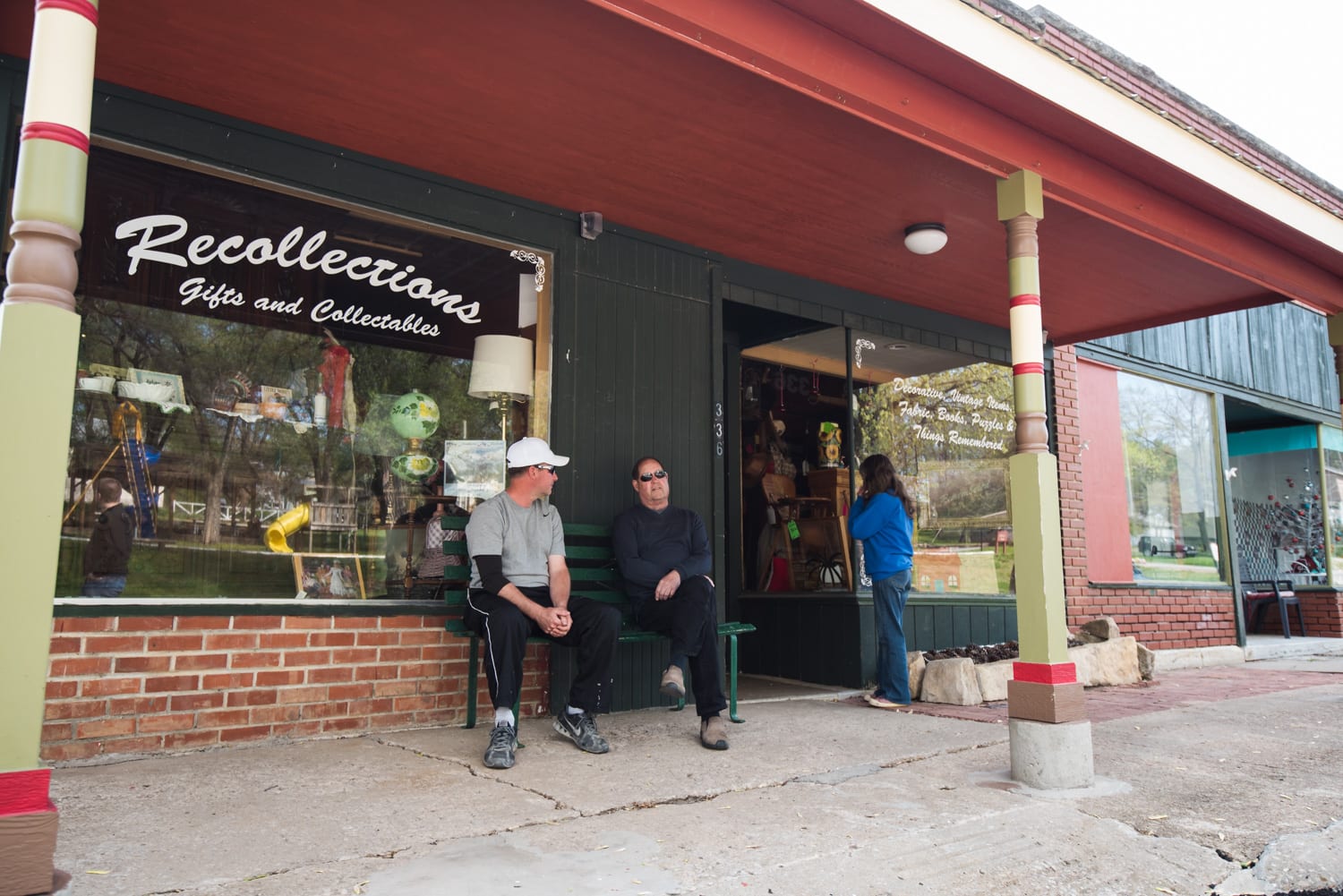
Shop at Recollections and Claymama’s on Elmore Street. Open on the weekends or by appointment.
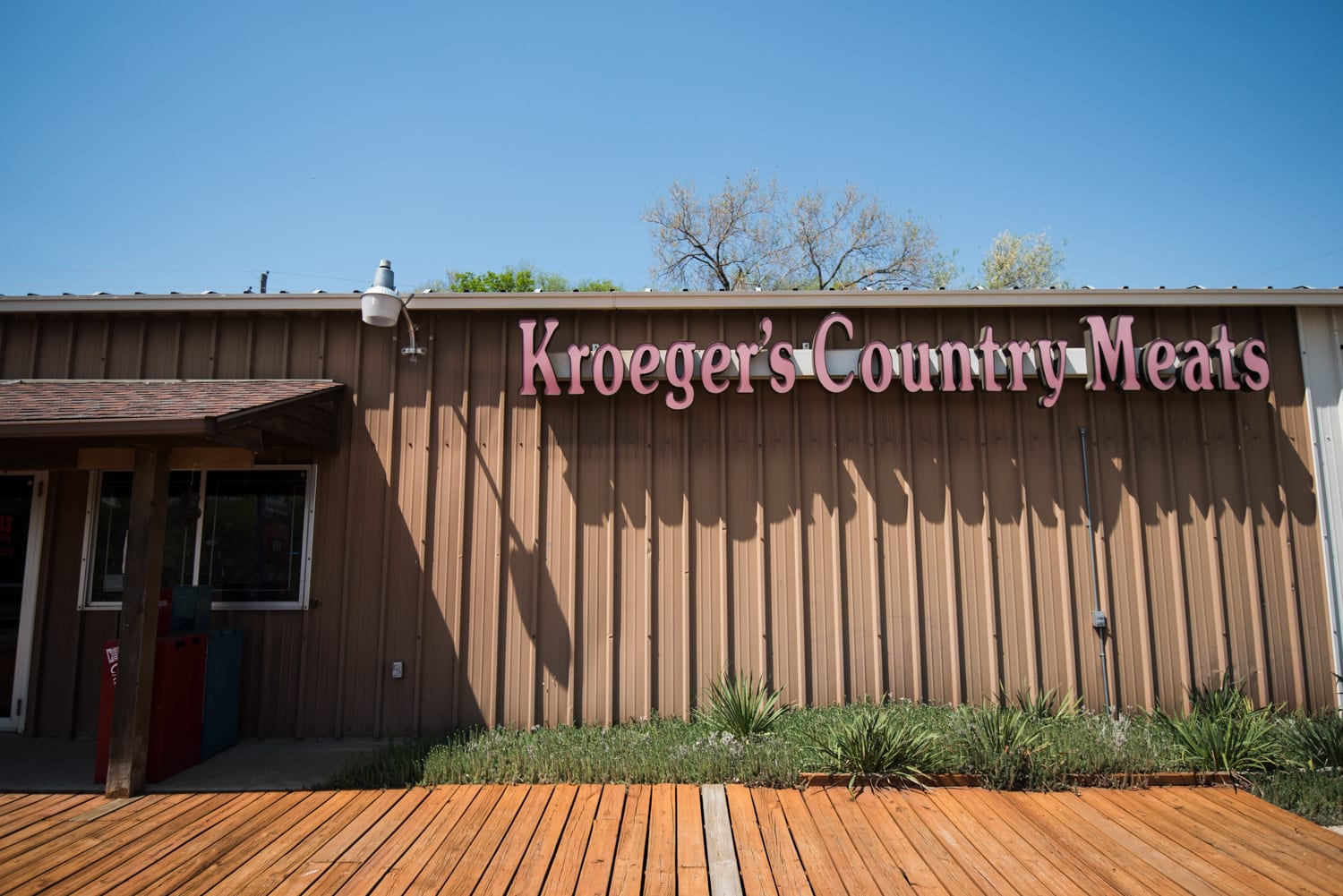
Get a sandwich, pop, or some of their famous 13 flavors of hand-made gourmet sausages at Kroeger’s Country Meats. On Hwy 1029 right around the corner from the museums and other shops.
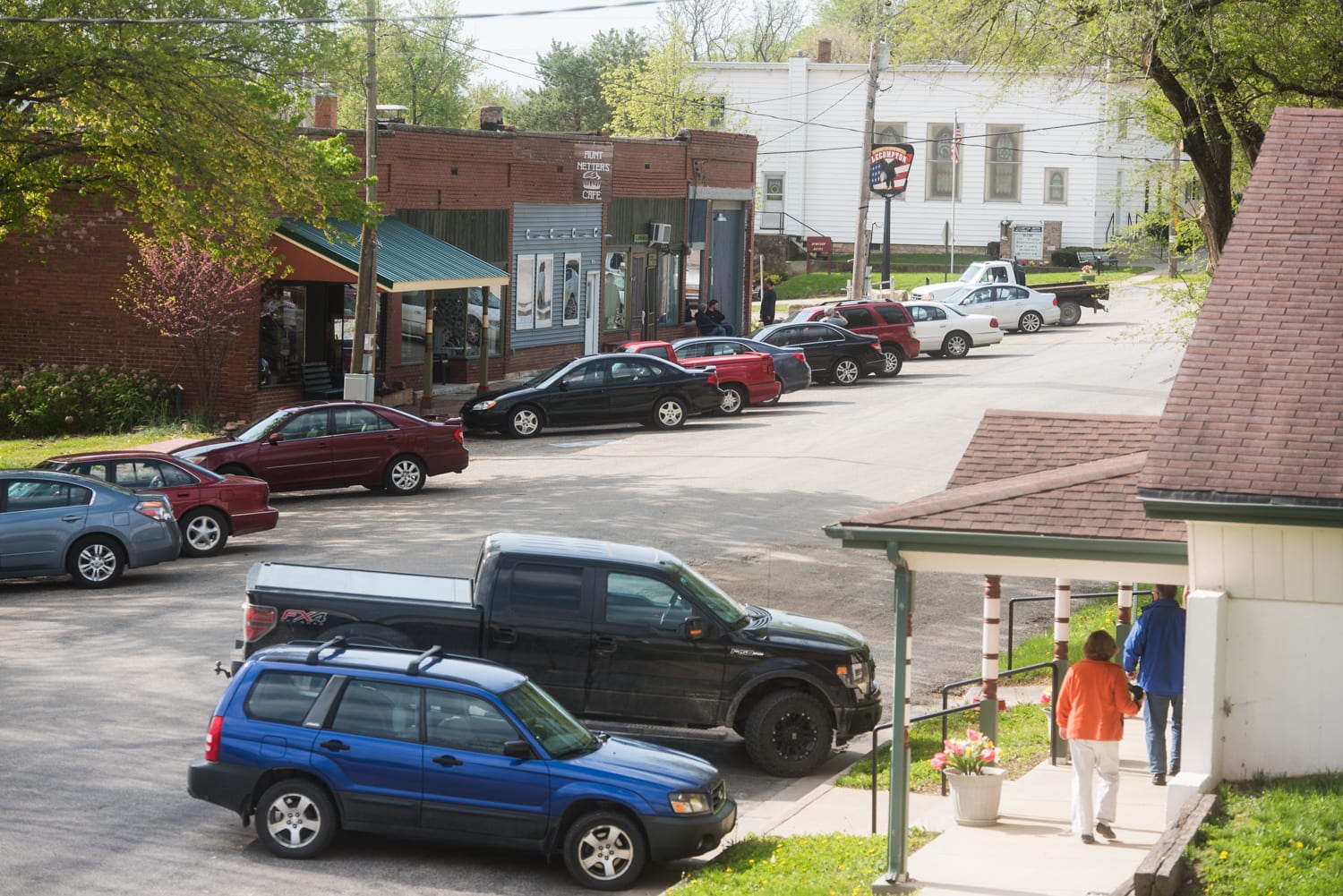
Downtown area on Elmore Street. Cute shops and restaurants!
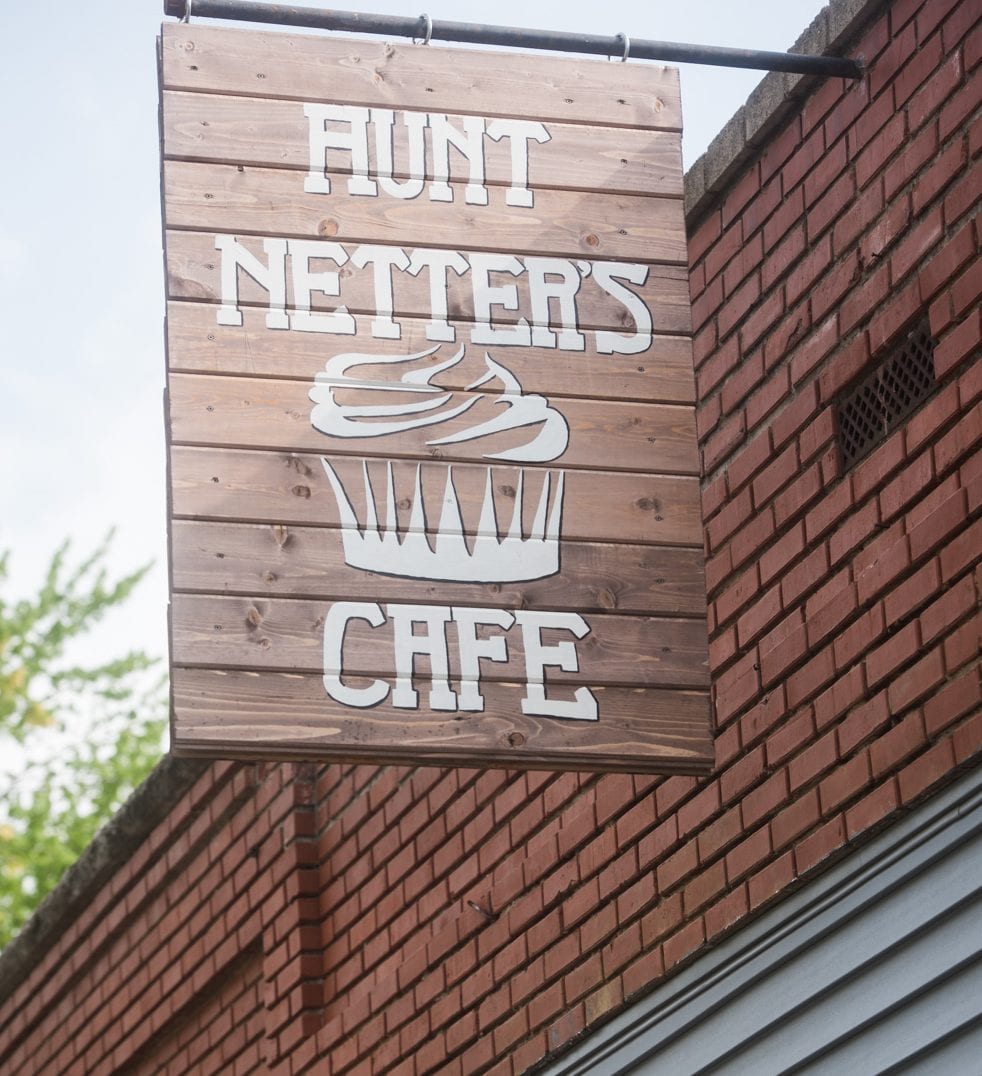
Famous for their fabulous desserts: pie, cinnamon rolls, cupcakes, cookies. Delicious breakfast and lunch menu at Aunt Netter’s on Elmore Street.
Henrys’ Plant Farm
Do you like plants? A fun place to visit and shop for plants is Henrys’ Plant Farm right outside Lecompton at 248 N. 1700 Rd. The Henrys’ Plant Farm is a family-owned & operated nursery celebrating over 30 years of growing and selling our own plants on the farm. At Henrys’, you will find a great selection of beautiful plants, a wide variety of animals, a relaxing friendly atmosphere and a knowledgeable staff ready to help you. Make sure you look for the Butterfly garden–a garden shaped like a butterfly and it attracts butterflies! Visit their website for hours and info: thehenrysplantfarm.com
Rowena Park
Stretch your legs and play for a spell in our town park at the corner of Elmore Street and Woodson Avenue. The city of Lecompton recently added new playground equipment! A three-story, 45 x 90 foot, nineteen-room limestone hotel once stood at this location. Completed in 1858. Financed by Lecompton investors hoping to convince the territorial legislature to keep the capital in Lecompton. Advertised as one of the finest hotels in the territory. In 1865, the hotel served as the beginning of Lane University and the dormitory. City of Lecompton purchased the vacant lots where the hotel had once stood and created Rowena Park in 1982.
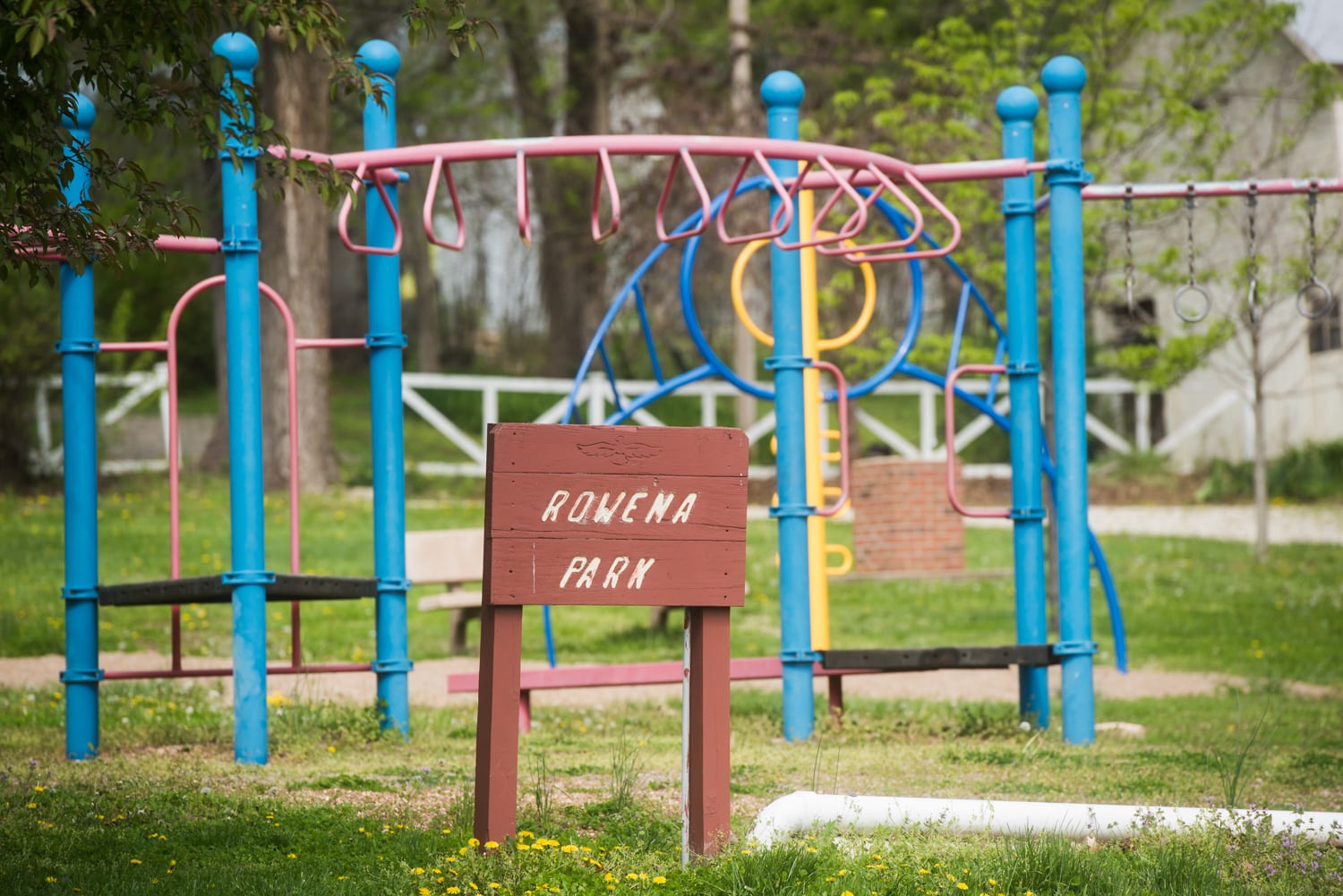
Curb and Brick Sidewalks (1888)
Admire our curbs and sidewalks. The original stone curbing still keeps the streets from flooding to this day. The original city sidewalks were wood. Bricks have the initials G.S.B. & R.T. Co.. Manufactured by Greene, Star, Brick, Rock, and Tile Company.
Bleeding Kansas Lecture Series
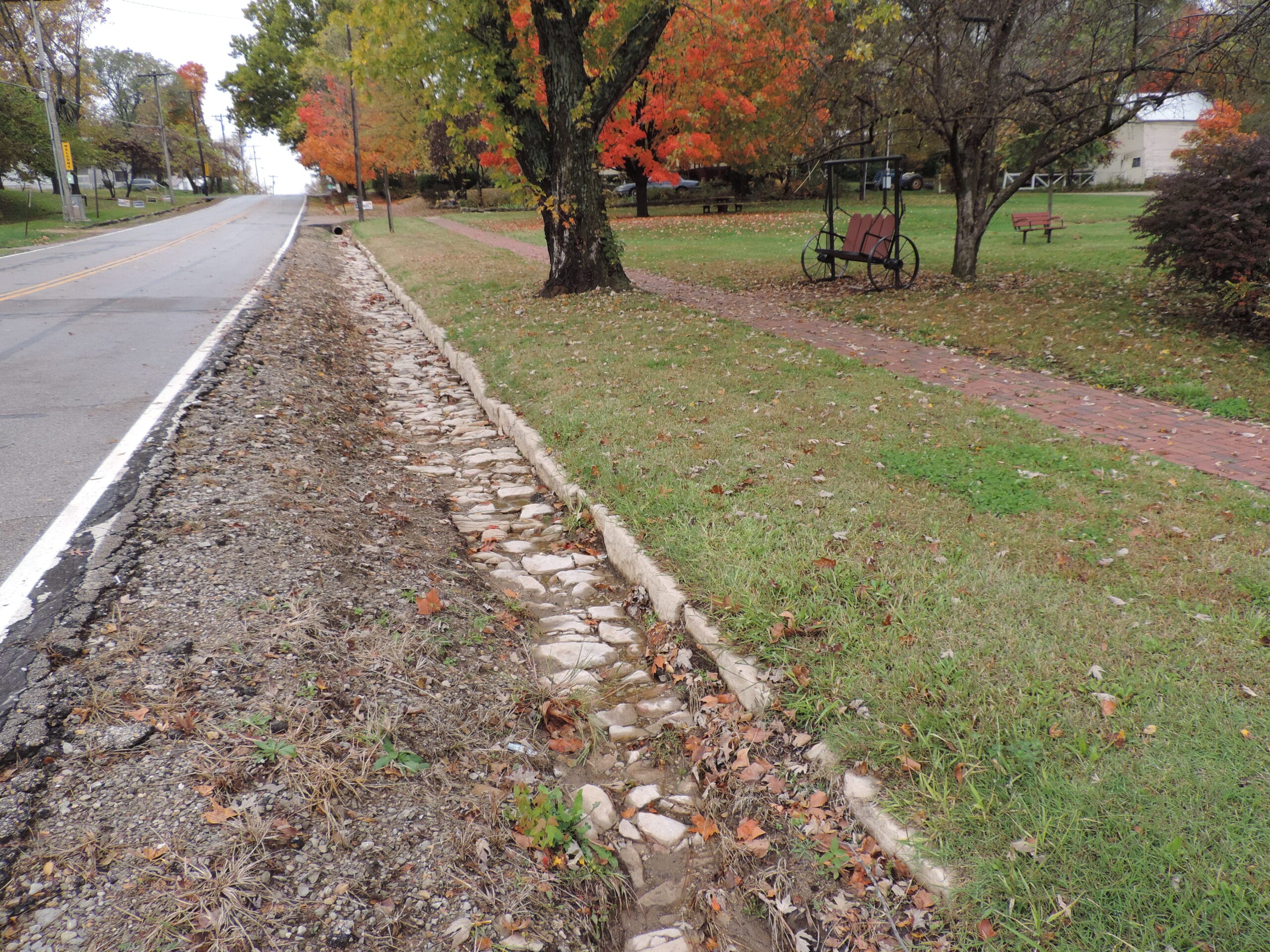
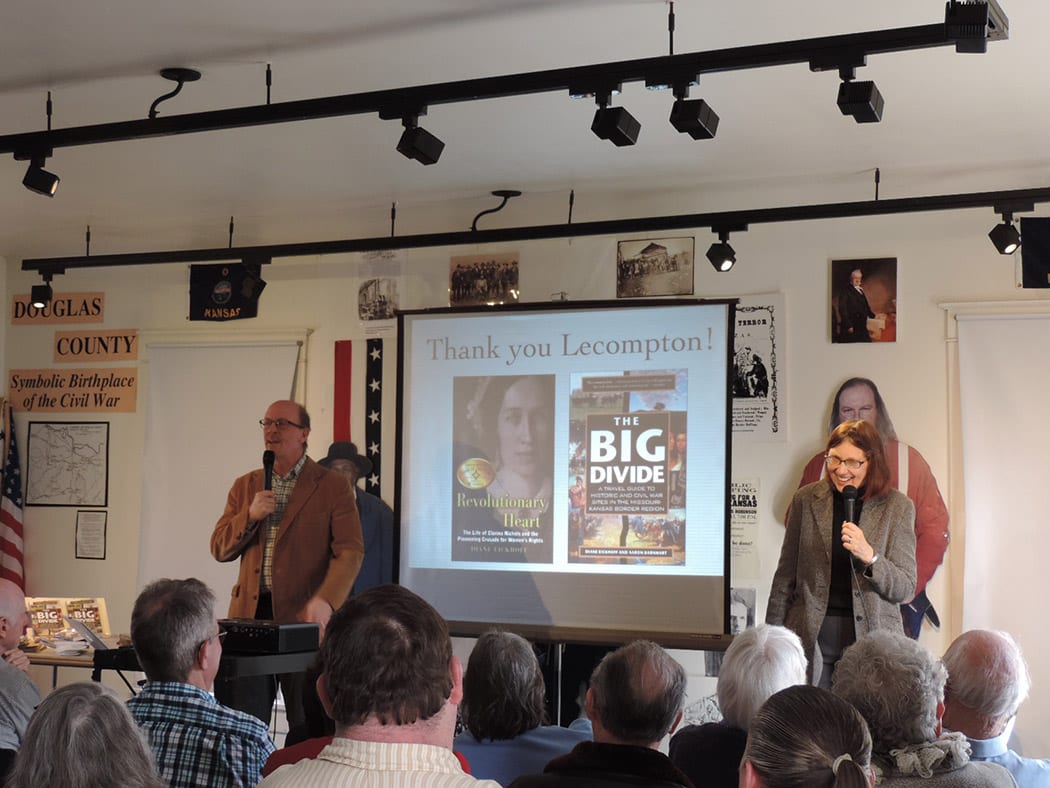
Visit us at the end of January and during February for the Bleeding Kansas Speaker Series in Constitution Hall.
Christmas in Lecompton
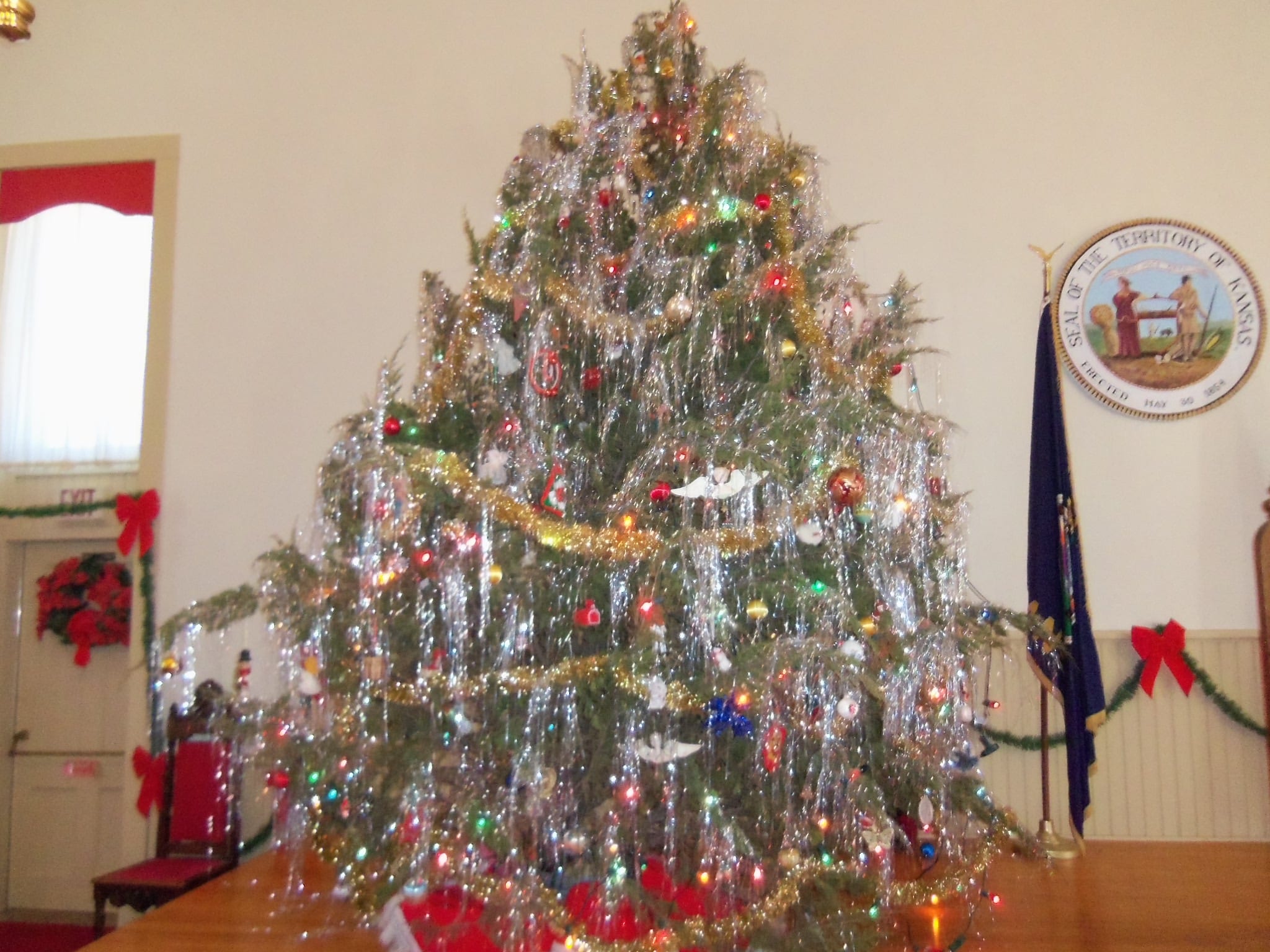
Territorial Days
Visit us in June for Territorial Days.
